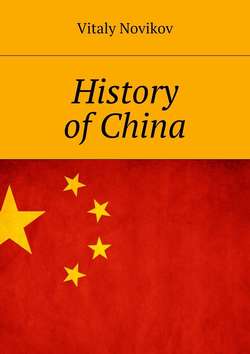History of China

Реклама. ООО «ЛитРес», ИНН: 7719571260.
Оглавление
Vitaly Novikov. History of China
Shang
Western Zhou
Eastern Zhou
Family. Astronomy. Medicine
Jan go
Qin
Han
Three kingdoms. Jin Dynasty
Huns, Jinbei and Sino-Tangut
Sui. Tang
Song
The Mongols. The Yuan Dynasty
The Ming Dynasty
Qing
The Republic of China
PRC
Отрывок из книги
People have inhabited the territory of modern China in the Stone Age. Archaeologists have found traces of their activity. The earliest finds date back to the third millennium BC. The ancient Chinese had a matriarchy, as the other ancient peoples. The kin was conducted by a father, but not a mother. Gradually the power passed into the tribes to men to the leaders. The leader of a tribe ruled together with the council of elders.
In the 18th century BC, the tribe Shang won Xia tribe. Shang created own state. Their political center was located in present-day Henan province. Shang is sometimes naming Yin. The social system of the Shang was the slave. In this state, the production of tools and weapons made of copper and bronze was established. Animal husbandry and agriculture were distributed. The millet was the most popular culture. At this time the moth has already bred for the production of silk. Mulberry trees were grown. In everyday life and for the war elephants were used, which brought the dependent tribes. A manufacture of various products has increased and therefore began to establish the exchange of goods. The measure of value was the cowrie shell, and when it did not have its analogues made of jade and other materials.
.....
The Emperor ruled by King – Wang. Wang is about the governor. Hieroglyph Wang consists of two elements: a great and unique. Wang called the son of the sky, that is, his power in the ideological sense, had a divine origin. Wang was the nominal landlord of all the lands of the state, the high priest and the chief rolled into one. The slave-owning aristocracy was a step below in the hierarchy. These were the sons, relatives and subordinates of the king. Warlords called Hou. Bo literally means uncle. Bo used to be the rulers of areas. Zi also ruled areas. Zi is the king’s son. A broad layer of free people is represented mainly by farmers-commoners. These people are called Min – people or Xiaomin – small people. Slaves were the lower strata of society powerless they traded for things, sold, and sometimes sacrificed to the gods as well as livestock. The Shang had the army and prisons. The criminals were subjected to different executions: burning at the stake, hanging, quartering, beheading, burying alive in the earth. There were other punishments: cutting off the nose and ears, eye gouging, cutting off the hands and feet. Hieroglyphics suggest that people kept in the stocks, cells and pits – it was a species of a prison.
Shang kings subjugated neighboring tribes and their lands attached to their country. Other tribes became dependent from Shang kings. These tribes were paying tribute. The leaders of these tribes received various titles and honors from Shang kings. In this kind of dependence were tribes – Sian, Shoo, Chou. A lot of trouble brought Shang State nomadic tribes living in the north of its borders. Shang often fought with them. State Shang was destroyed Zhou tribe, when the leader of this tribe U Wang has defeated the army Shang ruled Shaw (Di) Xin in the Battle near Moe. A betrayal and a desertion to the enemy of the few Shang commanders contributed to the Zhou victory. The last ruler of the Shang Shou (Di) Xin rules from 1154 by 1122 BC (dates tentative, the exact dates are considered only from the 9th century BC).
.....